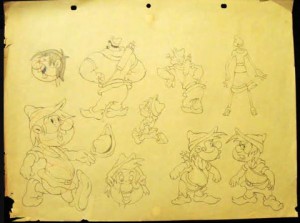 Irrespective and regardless of the success of the Noveltoons, bread and butter for Famous Studios continued to be Popeye the Sailor. The writers continued to think they had endless possibilities in the combination of Popeye, Olive Oyl, and Bluto, with Olive always rejecting Bluto’s crass advances. It was developing into a formula. This was at about the same time one of Terrytoons’ series was similarly developing a formula, with the triangle of Mighty Mouse, Pearl Pureheart, and Oil Can Harry. The crosstown rivals were thinking alike.
Irrespective and regardless of the success of the Noveltoons, bread and butter for Famous Studios continued to be Popeye the Sailor. The writers continued to think they had endless possibilities in the combination of Popeye, Olive Oyl, and Bluto, with Olive always rejecting Bluto’s crass advances. It was developing into a formula. This was at about the same time one of Terrytoons’ series was similarly developing a formula, with the triangle of Mighty Mouse, Pearl Pureheart, and Oil Can Harry. The crosstown rivals were thinking alike.
However, Win Sharples’ scores began to borrow less and less from popular music, and rely Increasingly on endless mood variants upon the sailor’s theme, “Sailor’s Hornpipe”, and original mood music, resulting in less and less subject matter for this series of articles. We thus follow the sailor through to the end of his theatrical career, which ended with an episode contributing no new pop melodies, which seemed to be a cross of the studio’s two most successful genres, crossing Popeye with a cast that looks like it stepped out of a Casper cartoon – Spooky Swabs, which will otherwise not be further discussed here.
Robin Hood-Winked (11/17/48) – Your basic story of Robin Hood, with Popeye in the title role, Bluto as Ye Tax Collector, and Olive as the proprietor and waitress at the local inn. (Watch for one of the studio’s most glaring animation errors in the inn sequence, where a background element is never placed before the camera, revealing a series of cels where Bluto’s legs are not completely drawn or painted in, as they were expected to be eclipsed by an object in the foreground.) Popeye, shooting at a target, gets a real bull’s eye, which doesn’t suit the bull one bit. A favorite gag is also revisited about splitting an arrow already in the target – in this case, about five times. Little John (a half-pint character that had previously appeared in several cartoons) is not of much use except for the final gag. Ye Tax Collector winds up dragging the wagon holding all of the ill-gotten gold, and Little John spurs him on.
 Songs: “I’m Robin Hood”, an original, which would be remembered and retreaded again for a later Herman and Katnip short, Robin Rodenthood. Also included is an old standard, “Drink To Me Only With Thine Eyes”, a song that was considered “old” when it was used as the number Owl Jolson hated to sing in Tex Avery’s I Love To Singa. Emilio De Gorgoza recorded it on Red Seal Victor. John McCormack performed it on the same label around 1912. Charles Hackett covered it as a Columbia Exclusive Artist. A Victrola red seal version was issued acoustically by the Flonzaly Quartet, a string group.. Felix Arndt performed a celeste solo on standard Victor. Lawrence Tibbett would record it electrically on red seal Victrola. In England, Peter Dawson recorded it for Zonophone. Ben Davis would also sing it on British Columbia. Paul Robeson performed it for HMV red seal. For a change, a female rendition appeared on English Decca by Kathleen Ferrier. Back in the states, John Kirby would attempt to swing it for Vocalion about 1939. Maxine Sullivan would give it a whirl on Victor (embed below). Marek Weber would perform a Columbia instrumental in the 1940’s. Robert Merrill would record a much-later electrical version on RCA Victor red seal. Jeanette Macdonald would also wax am RCA version around this time.
Songs: “I’m Robin Hood”, an original, which would be remembered and retreaded again for a later Herman and Katnip short, Robin Rodenthood. Also included is an old standard, “Drink To Me Only With Thine Eyes”, a song that was considered “old” when it was used as the number Owl Jolson hated to sing in Tex Avery’s I Love To Singa. Emilio De Gorgoza recorded it on Red Seal Victor. John McCormack performed it on the same label around 1912. Charles Hackett covered it as a Columbia Exclusive Artist. A Victrola red seal version was issued acoustically by the Flonzaly Quartet, a string group.. Felix Arndt performed a celeste solo on standard Victor. Lawrence Tibbett would record it electrically on red seal Victrola. In England, Peter Dawson recorded it for Zonophone. Ben Davis would also sing it on British Columbia. Paul Robeson performed it for HMV red seal. For a change, a female rendition appeared on English Decca by Kathleen Ferrier. Back in the states, John Kirby would attempt to swing it for Vocalion about 1939. Maxine Sullivan would give it a whirl on Victor (embed below). Marek Weber would perform a Columbia instrumental in the 1940’s. Robert Merrill would record a much-later electrical version on RCA Victor red seal. Jeanette Macdonald would also wax am RCA version around this time.
Symphony in Spinach (12/21/48) – Popeye and Bluto both apply for the same ad, showing off their musical virtuosity for Miss Olive Oly at her conservatory. Bluto of course tries to pitch some woo, leading to the most memorable line of the film – “Don’t B flat. B Natural.” Popeye’s spinach allows him to defeat Bluto and become a one-man band, using drum pedal and high hat to pummel Bluto. Songs: “I’m in the Mood for Love” (as Bluto’s theme), “A Life on the Ocean Waves” (as Popeye’s theme), and “Melody in F” by Rubenstein. Most recordings of this piece were cello solos. Victor Sorlin on black seal Victor, Hugo Kreisler (Fritz’s brother) on red seal Victor, and a young Pablo Casals on HMV. The melody was accessible enough that there were dance versions by Anson Weeks on Brunswick, and Tommy Dorsey on Victor (below). Later, it would be jazzed up for piano by Ben Light on Tempo, and Hadda Brooks on Modern as “Melody in F Boogie”, which probably went over well in her Central Avenue club.
Hot Air Aces (6/24/49) – Popeye and Bluto compete in an air race. Bluto as usual resorts to sabotage, opening up the hood of Popeye’s plane, ripping out the motor, and stating, “Your engine’s missing.” Popeye crashes into the ocean, but reassembles the motor on the ocean floor, excepting missing engine pistons, for which he substitutes his spinach cans, supercharging the engine to win the race. Songs are all used as “markers” to illustrate the progress made in the race. Songs: “The Carnival of Venice”, “Lesghinka”, and “La Marseillaise” (French National Anthem). The latter was most notably recorded by the Republican Guard Band, recorded acoustically on Columbia and electrically on HMV, imported here on Victor. They revisited the number again for Columbia in the 1930’s. Victor had also recorded two prior versions by Sousa’s band, both acoustic. Edison offered a Diamond Disc by the New York Military Band. Vocal versions were also recorded by Victor as “Senor Francesco” (actually Emilio De Gorgoza, when he appeared on black label), and Frances Alda on Red Seal Victrola (below). The Choir of the Red Army recorded it for Columbia in Paris in the 1930’s. Georges Thill also performed it on Columbia in the early 30’s.
The Fly’s Last Flight (12/21/49) – Popeye is determined to take an afternoon nap at his middle class-home, but everything is conspiring against him. Woodpeckers, crying babies, jack hammers, and toothpaste commercials on neighboring radios, then finally a pesky house fly, all prevent him from drifting off to the land of nod. A technicolor reworking of “Flies Ain’t Human”, with some inspiration from “Stop That Noise” and “Sock-a-Bye Baby”, including occasional reused gags. The fly winds up consuming spinach from one of the sailor’s open spinach cans, and becomes a flyweight champ. The end shot finds the flies performing a square dance on Popeye’s head, and Popeye strumming his lips as he goes berserk. Songs: “Brahams’ Lullaby”, “Where Has My Little Dog Gone”, “Turkey in the Straw”, and an original “Super-White” mock-radio jingle, heard on the radio, prompting Popeye to sock a console radio, the force of the blow electrically transmitted back to the broadcast station, knocking the announcer’s teeth out in shards.
Only an excerpt from the restored cartoon, below.
Shaving Muggs (10/9/53) – A Technicolor remake of A Clean Shaven Man, without the original song from the preceding film or the under-the-breath ad libs of the cast, it evertheless still retains a degree of charm. Both films have similar payoffs, with Olive going around with a fellow with a big bushy beard, despite telling the boys she wouldn’t date them unless they got a shave and a haircut. Song: “Paris In the Spring” (with a special lyric that indicates the studio staff’s allegiance to the Dodgers in baseball season, referring to “Brooklyn in the Fall”). Recorded for Victor by Ray Noble with Al Bowlly, on Brunswick by Freddy Martin (below), and on Melotone, Perfect, et al by Joe Reichman and his Orchestra.
Floor Flusher (1/1/54) – Olive, trying to decorate a cake, is quite annoyed by a dripping water faucet. Her attempts to stop it result in a gushing water outlet, and her consuming pitcher after pitcher of the wet stuff to keep the flow from spoiling the cake. Popeye and Bluto compete to stop the leak, Popeye succeeding by installing the tap off a seltzer bottle. Bluto appears to concede that “the best man won”, but slips away into the cellar, to cross-up all the plumbing pipes to make Popeye’s life miserable, flooding the house. Popeye ultimately has his spinach delivered to him by goldfish, and empties the house of water and Bluto by picking it up bodily, pouring the contents down the sewer gutter outside. Songs: a return for Warner Brothers’ ”By a Waterfall” from Footlight Parade, worked in cleverly as Popeye serenades Olive to a piano roll at a player piano, only to have Bluto’s piping job cause a literal waterfall to erupt in Olive’s face from behind the piano roll.
Parlez Vous Woo (9/12/56) – Popeye and Olive are at her house, watching television. Olive (who actually has a shape in this cartoon, enough to support a strapless evening gown!) is enamored of “The International”, a suave European whose romantic monologue is a takeoff upon television personality of the time known as “The Continental” – real name Renzo Cesana. Bluto is outside, complaining that Popeye got there before he did, and assumes the role of The International to try to take Olive away for a date. But Bluto will be Bluto, and the mask of the bon vivant eventually falls away. The disguise is seen through, and spinach-powered Popeye gives Bluto the usual come-uppance. Song: “Cocktails for Two”, recorded by Carl Brisson on Brunswick, Johnny Green on Brunswick, Duke Ellington on Victor, and Spike Jones in a million-selling parody on Victor.
Next Post: More Screen Songs.


 James Parten has overcome a congenital visual disability to be acknowledged as an expert on the early history of recorded sound. He has a Broadcasting Certificate (Radio Option) from Los Angeles Valley College, class of 1999. He has also been a fan of animated cartoons since childhood.
James Parten has overcome a congenital visual disability to be acknowledged as an expert on the early history of recorded sound. He has a Broadcasting Certificate (Radio Option) from Los Angeles Valley College, class of 1999. He has also been a fan of animated cartoons since childhood.











































Anton Rubinstein’s Melody in F was one of the first works that Pablo Casals recorded for HMV in 1926 (accompanied on the piano by his frequent collaborator Nicolai Mednikoff), launching a thirty-year association with the company. But, given that he was born in 1876, the “young Pablo Casals” was actually in his fiftieth year at the time. However, Casals remained active as a cellist, conductor and teacher right up until his death at age 96; and he married a 21-year-old violinist when he was 80. If age, or youth, is a state of mind, then I suppose the phrase “a young Pablo Casals” could be applied to the man at any point in his long life.
That number from “Footlight Parade”…. I’ve got to watch that again. Absolutely breathtaking.
Pablo Casals was even referenced in a episode of Leave it to Beaver (“Eddie’s Sweater”), of all things.
“Zoom-Zoom-A-Zooma-Zooma-Zooma-Zooma…”
I remember that! Casals had been a staunch supporter of the Republic during the Spanish Civil War, and he despised Franco so much that he refused to perform in any country that had diplomatic relations with that regime. This principled stand effectively put an end to his concert career for many years, but he made an exception to play for President Kennedy at the White House; Kennedy also awarded him the Presidential Medal of Freedom. This was big enough news that even a wise guy like Eddie Haskell would have known about it.
Casals was also mentioned in an episode of “All in the Family”, in which a man cited the example of two famous Pablos — Casals and Picasso — to justify his cheating on his wife with younger women.
Sorry — I’ve wandered a long way from Popeye, Olive and Bluto, haven’t I?
Popeye could have done worse than go out with “Spooky Swabs,” which is actually one of the better latter-day entries. Though hardly a patch on its 1934 predecessor “Shiver Me Timbers,” the artwork has a nice sunset feel to it. But the series was tired.
I still wish some company would release a set of figures based on the Famous Studios designs of the characters! No matter how much those die hard Popeye fans grouse about the quality and content of the cartoons as opposed to the Fleishers, you just know they would snatch up a new set of figures at any price.